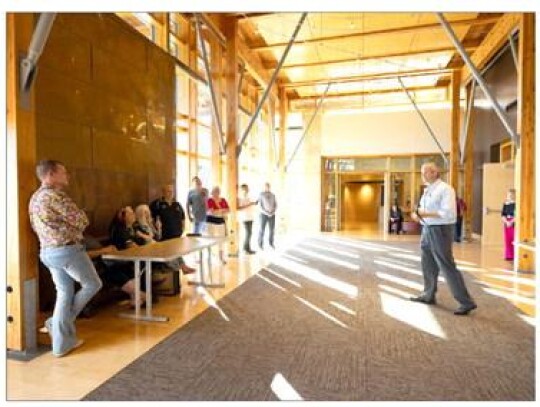ADA, Okla. - A contingent of Maori tribal leaders from New Zealand visited with Chickasaw Nation Governor Bill Anoatubby Nov. 8, learning about the history, mission and progress of the Chickasaw Nation.
The gubernatorial visit was followed by a daylong tour of Chickasaw Nation facilities and discussions about the programs and services designed to enhance the lives of Chickasaw people.
Governor Anoatubby provided an overview of the Chickasaw Nation, its mission, sovereignty, governmental structure, and history of perseverance, determination and progress.
He explained how key federal legislation, such as the Indian Self-Determination and Education Assistance Act of 1975, and significant milestones in Chickasaw Nation government, including the 1983 Constitution, served as a foundation for the progress the tribe has experienced in the last few decades. This progress is based on sovereignty as an inherent right of First American tribes.
'Our status is dependent upon our relationship with the federal government, which goes back to treaties, federal law and Supreme Court decisions. That is what shapes our relationship with the federal government and all the people around us. Because of our unique status, it is not always understood by those who are not part of it, so that's what leads often times to conflict,' Governor Anoatubby said.
'We continue to work and educate people, and we focus on our goals and our mission: 'To enhance the overall quality of life of the Chickasaw people.'' In 1983, the Chickasaw people ratified the tribe's modern constitution, which established three departments of government — the executive, legislative and judiciary.
'Our government is one that functions very harmoniously. We are able to focus on why we are here,' he said.
Governor Anoatubby said many of the tribe's programs and services were developed because of feedback from the Chickasaw people.
Following the visit with Governor Anoatubby, the group took a driving tour across Ada. They stopped at the Chickasaw Nation Medical Center to meet with Rear Adm. Kevin Meeks, who serves as Chickasaw Nation Deputy Secretary of Health, Under Secretary Carrie Law and other health leaders. They learned about programs and services there and had a dialogue about shared experiences and learnings.
The tour concluded with a stop at the Chickasaw Cultural Center in Sulphur, Oklahoma, where they visited with Under Secretary of Culture and Humanities Valorie Walters. Language preservation initiatives were one of the main topics of discussion.
Tour participant Nigel Chee currently serves as theTe Pou Matua (chief executive) ofTe Kotahitanga for the Tribe of Ngati Tuwharetoa.
He said meeting Governor Anoatubby was beneficial because of the overview of the development path he shared.
'Because he talked about the phases, the Governor's discussion was perfect. I think that's the most important course for us and certainly for me. Hearing that intergenerational story of development was useful context, we understand there is a history to it,' Mr. Chee said.
Touring the facilities was the 'manifestation of that story he told us,' he said.
'To me, that demonstrates the importance of good, strong leadership and continuity.'' He said the pride and values of the Chickasaw people and employees are evident and he hopes to implement lessons learned from the visit at home, a country known as Aotearoa by the Indigenous people.
In addition to the Chickasaw Nation, the group spent the week touring the Choctaw Nation and Cherokee Nation before traveling to New Orleans to attend the National Congress of American Indians (NCAI) conference.
Tour coordinator Mara Andrews spent part of her career working with First Nations in Canada and attended NCAI during that time, where she was impressed by work of the FiveTribes.
'Always, the people leading the important work were the Five Tribes from Oklahoma. I've watched the leadership and reputation; the FiveTribes are always at the forefront of Native American issues and sovereignty issues,' she said.
A tour of three of the Five Tribes was planned, and Ms.
Andrews said it was the right decision.
'In the three days we've been here, we've been proven right, absolutely right. It was the right call.'
Ms. Andrews' tribal affiliations include Ngati Kahungunu, Ngati Raukawa and Te Whakatohea.
She said the challenge now is 'how do we translate what we've seen to our constitutional set up in New Zealand. We are effectively under the British monarchy, we're part of the Commonwealth, we're like Canada. But there are lessons here we can take, about supporting our leadership and building pride, building identity.'
The Maori comprise about 17% of the population of New Zealand, she said.
Participating in the tour was Helmut Karewa Modlik, leader of the Ngati Toa Rangatira, accompanied by wife Catherine; Wayne Blissett, Nga Puhi; Charli Tibbie, Ngati Porou; Hikitia Ropata, Ngati Toa Rangatira, Atiawa ki Whakarongotai, Ngati Raukawa, Ngati Porou; Nigel Chee, Waikato, Ngati Haua;and Danielle Harris, Chief Executive Officer of Tanenuiarangi Manawatu Incorporated, a representative body for Rangitane o Manawatu Ropu.



